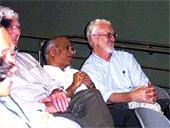Young Children’s Voices in Mathematical Problem Solving
Contributed by Dr Ho Siew Yin and Sng Wei Qin Abbie, from NTUC First Campus, for SingTeach Virtual […]
Read More
The Singapore education system is the primary tool for equipping Singaporeans with the skills they need to survive and thrive in a more complex and challenging global economy. How to move the education system from a mere efficient and effective system to one that allows more choice and promotes innovation and enterprise while still ensuring mastery of core concepts in the various disciplines is the challenge for policy and practice.
 The Core Research Program underway at the National Institute of Education is a multilevel analysis of Singaporean schooling, pedagogy, youth, and educational outcomes. It is tasked with answering questions surrounding the proposed changes to Singapore’s education system. It has done so by first getting a descriptive picture – a snapshot if you will – of what is currently going on in the system.
The Core Research Program underway at the National Institute of Education is a multilevel analysis of Singaporean schooling, pedagogy, youth, and educational outcomes. It is tasked with answering questions surrounding the proposed changes to Singapore’s education system. It has done so by first getting a descriptive picture – a snapshot if you will – of what is currently going on in the system.
Once we understand how the system functions at the level of the classroom, we can measure the effect of various interventions on the system as it is incrementally moved to better attain the Education Ministry’s goals.
In order to better understand just how effective the system is, we seek to measure a range of outcomes of the Singapore education system:
Examining such a range of outcomes will enable us to move beyond the present focus on examination success and to examine non-cognitive outcomes.
We have been gathering data from a variety of sources:
Although we will take into account a broad range of areas, we are particularly focused on:
Our data suggest that an effective pedagogy for teaching large classes to succeed in high-stakes examinations is the norm, but there are as yet few signs of teaching for critical and creative thinking and little evidence of attention to advanced concepts, knowledge criticism, knowledge application, and knowledge generation.
More detailed and nuanced findings should be available on the CRPP portal in a couple of months. Our data was also presented at our first conference in May/June 2005. Preliminary results will be reported to participating schools later this year.
Implications for this research will be broad and far-reaching. Understanding current practice, its strengths and weaknesses, will enable teachers to review their pedagogic practice and better align it to the goals proposed in the reforms. We believe that the research will be of great help to teachers who recognise the need for change, understand what change will require of them, and are then prepared to try out new strategies.
The year 2004 is our baseline year in which we collected the data that will act as the foundation for the remainder of the study. This year, 2005, we have extended the research into other areas of interest (more extensive research into lower primary, post-secondary, EM3 and Normal Technical streams, Mother Tongue, Science, Social Studies, etc.). We have aslo launched interventions at various sites which will be consistently monitored.
We have primarily captured a cross-sectional snapshot of the educational system last year; 2005 is seeing the initiation of the longitudinal facets of our research.
To find out more about CRPP and this project, please click here .